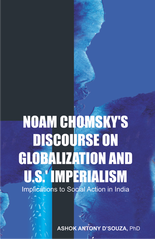|
Ashok Antony D'Souza, pp. 296, Rs. 500, Niruta Publications BACKGROUND AND RATIONALE Since the dawn of independence India has come a long way and has achieved much, especially in the fields of nuclear and Information Tech- nology (Chakravarty, 2008). Alongside these achievements we have also been witnessing growing authoritarian and repressive nature of the state. The developmental model pursued by the country has been largely in favor of the elites. The weaker sections of the society have grown more vulnerable. It could also be argued that the country was never so divided in economic, social, communal, and political fronts as it is today (Teltumbde, 2003). This mixture of successes and concerns makes sense only when we see it in its global totality. The processes of globalization, primarily led by the United States of America, actively embraced by India since 1991 in the form of New Economic Policy, have contributed in large measure to the anti-democratic and anti-people attitudes, policies and programs. India, as a fast developing country striving to attain its rightful place in this unipolar world order, has been greatly influenced by the neoliberal ideology and the foreign policy of the US (Bhambhri, 1996). It is not to say that all or most of our problems are caused by fac- tors external to our country and that we had no freedom whatsoever to effectively face them. However, it has to be recognized here that the traditional, domestic powers of domination have found a new lease of life due to the opportunities provided to them by the forces of neoliberal globalization (Aloysius, 1998). It is also to be accepted at the very outset that the processes of global- ization have thrown up certain opportunities along with the challenges we have mentioned. There is a general sense of euphoria in the country based on certain predictions of India dominating the economic sphere of the world by 2020 (Bidwai, 2006). However, we need to realize that unless we address the multitude of challenges faced by the country the prospects for such a growth would be greatly thwarted. We need to also understand that even if we attain the projected growth targets without attending to these challenges India would remain less of a just and ‘de- veloped’ country due to the exclusivist and lope-sided features of this achievement. Addressing the numerous challenges faced by the country and real- izing the opportunities available for a more inclusive and sustainable development requires the partnership of enlightened and committed social activists (Kothari, 2006). India had no dearth of such activists who even before Independence strove hard to uphold the worthy val- ues of social justice and equality. Along with fighting external bondage and imperialism they also denounced the internal tendencies and prac- tices of injustice and dominance (Aloysius, 1998). We require a strong band of such activists today than ever before to work for the cause of the victimized sections of our society and to strengthen the country in its struggle towards inclusive development. It has to be noted here that even a social activist in some way is a product of the times (John, 1982). Hence, while studying social action as a response to the present challenges we should also be sensitive to the social, political, economic and ideological factors that form and influ- ence the ethos and praxis of an activist. The waves of globalization and imperialism would have influenced the ideology and practice of social action at least to a certain extent. While reflecting on the nature and extent of this influence it is also imperative that we take a critical look at the kind of analyses and strategies used by social activists and evaluate their relative worth and effectiveness. As suggested in the title, this study hopes to understand the implica- tions of globalization and US imperialism to social action in India based on Noam Chomsky’s discourse on them. The major purpose of this in-troductory chapter is to present a background and rationale to the study in general, based on which the later chapters will try to take up certain specific aspects for analyses and discussion. First, the definitions and historical evolution of some important concepts forming the core of our study have been discussed. Next, an attempt has been made to present the overall impact of some of these phenomena. Then, a brief profile of Noam Chomsky and his ideas has been given so that their relevance to social action and professional social work is rightly understood. Finally, the chapter is concluded with the presentation of the research questions for which an attempt is made to find suitable answers through this study.
0 Comments
Your comment will be posted after it is approved.
Leave a Reply. |
20,000 HR PROFESSIONALS ARE CONNECTED THROUGH OUR NIRATHANKA HR GROUPS.
YOU CAN ALSO JOIN AND PARTICIPATE IN OUR GROUP DISCUSSIONS. Categories
All
|
||||||
SITE MAP
SiteTRAININGJOB |
HR SERVICESOTHER SERVICESnIRATHANKA CITIZENS CONNECT |
NIRATHANKAPOSHOUR OTHER WEBSITESSubscribe |
MHR LEARNING ACADEMY
50,000 HR AND SOCIAL WORK PROFESSIONALS ARE CONNECTED THROUGH OUR NIRATHANKA HR GROUPS.
YOU CAN ALSO JOIN AND PARTICIPATE IN OUR GROUP DISCUSSIONS.
YOU CAN ALSO JOIN AND PARTICIPATE IN OUR GROUP DISCUSSIONS.
|
|


 RSS Feed
RSS Feed





